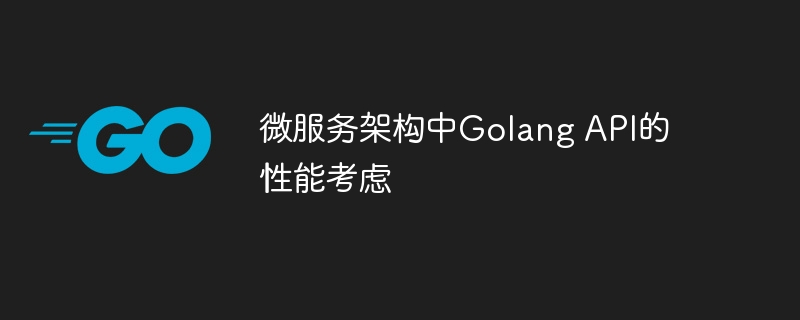마이크로서비스 아키텍처의 Golang API에 대한 성능 고려 사항
- WBOYWBOYWBOYWBOYWBOYWBOYWBOYWBOYWBOYWBOYWBOYWBOYWB원래의
- 2024-05-07 18:36:011144검색
Go API의 성능을 최적화하려면 다음을 수행하는 것이 좋습니다. 1. 정적 파일 캐싱 메커니즘을 사용합니다. 2. 성능 병목 현상을 발견하고 해결하기 위해 분산 추적 메커니즘을 사용하여 요청 처리 프로세스를 추적합니다. 이러한 기술은 효과적으로 대기 시간을 줄이고 처리량을 향상시켜 마이크로서비스 아키텍처의 전반적인 성능과 안정성을 향상시킬 수 있습니다.

마이크로서비스 아키텍처에서 Go API의 성능 최적화
소개
마이크로서비스 아키텍처에서는 성능이 중요합니다. 이 기사에서는 대기 시간을 줄이고 처리량을 늘리기 위해 다양한 기술을 통해 Go API의 성능을 최적화하는 방법에 중점을 둘 것입니다.
코드 예
정적 파일 캐싱
// ./handlers/cache.go
package handlers
import (
"net/http"
"time"
"github.com/go-cache/go-cache"
)
// Cache is an in-memory cache.
var Cache = cache.New(5*time.Minute, 10*time.Minute)
// CacheRequestHandler is a middleware that caches HTTP responses.
func CacheRequestHandler(next http.Handler) http.Handler {
return http.HandlerFunc(func(w http.ResponseWriter, r *http.Request) {
// Check if the response is already cached.
if cachedResponse, found := Cache.Get(r.URL.Path); found {
// If found, serve the cached response.
w.Write(cachedResponse.([]byte))
return
}
// If not found, call the next handler.
next.ServeHTTP(w, r)
// Cache the response for future requests.
Cache.Set(r.URL.Path, w, cache.DefaultExpiration)
})
}// ./main.go
package main
import (
"fmt"
"net/http"
"github.com/gorilla/mux"
"./handlers"
)
func main() {
r := mux.NewRouter()
// Add middleware to cache static file responses.
r.Use(handlers.CacheRequestHandler)
}분산 추적
// ./handlers/trace.go
package handlers
import (
"context"
"fmt"
"net/http"
"github.com/opentracing/opentracing-go"
"github.com/opentracing/opentracing-go/ext"
)
func TracesHandler(w http.ResponseWriter, r *http.Request) {
// Create a new span for this request.
span, ctx := opentracing.StartSpanFromContext(r.Context(), "traces")
// Add some tags to the span.
ext.HTTPMethod.Set(span, r.Method)
ext.HTTPUrl.Set(span, r.RequestURI)
// Simulate work being done.
fmt.Fprintln(w, "Hello, traces!")
// Finish the span.
span.Finish()
}// ./main.go
package main
import (
"fmt"
"net/http"
"github.com/gorilla/mux"
"github.com/opentracing/opentracing-go"
"github.com/uber/jaeger-client-go"
"github.com/uber/jaeger-client-go/config"
)
func main() {
// Configure and initialize Jaeger tracer.
cfg := &config.Configuration{
ServiceName: "go-api",
}
tracer, closer, err := cfg.NewTracer()
if err != nil {
panic(err)
}
defer closer.Close()
opentracing.SetGlobalTracer(tracer)
r := mux.NewRouter()
// Add route that uses tracing.
r.HandleFunc("/traces", handlers.TracesHandler)
}결론
이러한 성능 최적화 기술을 구현함으로써 Go API는 마이크로서비스 아키텍처에서 효율적으로 실행될 수 있으므로 사용자 만족도와 전체 시스템이 향상됩니다. 성능.
위 내용은 마이크로서비스 아키텍처의 Golang API에 대한 성능 고려 사항의 상세 내용입니다. 자세한 내용은 PHP 중국어 웹사이트의 기타 관련 기사를 참조하세요!
성명:
본 글의 내용은 네티즌들의 자발적인 기여로 작성되었으며, 저작권은 원저작자에게 있습니다. 본 사이트는 이에 상응하는 법적 책임을 지지 않습니다. 표절이나 침해가 의심되는 콘텐츠를 발견한 경우 admin@php.cn으로 문의하세요.

